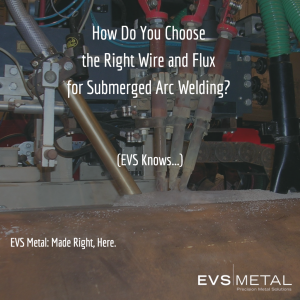
Submerged arc welding (SAW) is a common and extremely useful arc welding process that requires the use of a continuously-fed consumable solid or metal-cored tubular electrode. In this case, submerged definitely does not mean submerged in water, but instead refers to a protective field of granular, fusible flux that consists of compounds such as silica, calcium fluoride and lime. These materials protect the molten weld and arc zone from atmospheric contamination during the welding process, preventing spatter and sparks as well as suppressing potentially harmful UV radiation and fumes that often result from arc welding processes. During SAW, the arc is usually submerged under the flux material and therefore not visible while welding is occurring.
How to Choose the Right Wire and Flux Material for Arc Welding
While the process of arc welding isn’t complicated in and of itself, there are aspects of the process requirements that should be addressed before going forward. One of the most important is choosing which type of wire and flux material should be used. An excellent resource for this type of information is almost always the American Welding Society which defines a wide range of classifications and codes, and very clearly lays out the specifications for different materials based on the design and fabrication requirements indicated. Because the combinations of flux and wire pairings available are practically endless, it’s extremely important to understand how the wire and flux will interact with not just each other, but the material to be welded. After all, skilled welders don’t just know how to weld, but also understand the complex interplay of the many materials that can be involved in welding in order to ensure the desired outcome.
Understand the Potential Uses and Use Environments of the Product to be Arc Welded
Besides a thorough grasp of the materials involved in SAW, it’s also important to understand how and where the finished product will be used, post-welding, and in particular, to what type of load the item will be subjected. For instance, some products will need to be able to handle multiple changes in load, while others will only be required to handle a single, static load type while in use. Other products may be used in extreme temperatures, or those that run the risk of corrosion. All of these use cases require completely different kinds of weldments, which are often the result of different wire and flux combinations. Understanding which combination is best suited for the situation at hand — and acknowledging that price cannot be the only consideration — is essential for ensuring that the end product is able to consistently meet quality and safety standards once in use.
EVS Metal is an American precision sheet metal fabricator headquartered in Riverdale, NJ. Our machinists and operators utilize the latest technology to cut, bend and finish stand-alone items as well as parts for integration or assembly into more complex products. Our four ISO 9001:2015-certified locations comprise over 250,000 square feet of vertically-integrated manufacturing space and feature the most modern equipment available, from lasers and CNC machining centers to automated powder coating lines. We serve a diverse customer base across North America, providing a range of services from ITAR-compliant, quick-turn prototypes to high-volume production runs. Request a personalized metal fabrication quote online, or call (973) 839-4432 to speak with a specialist today.





